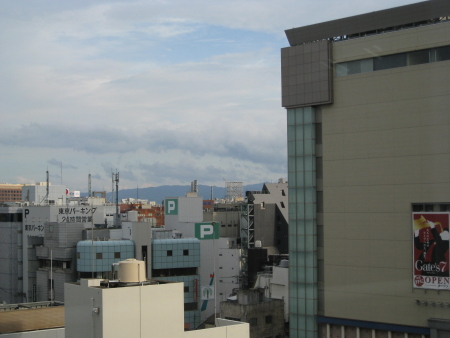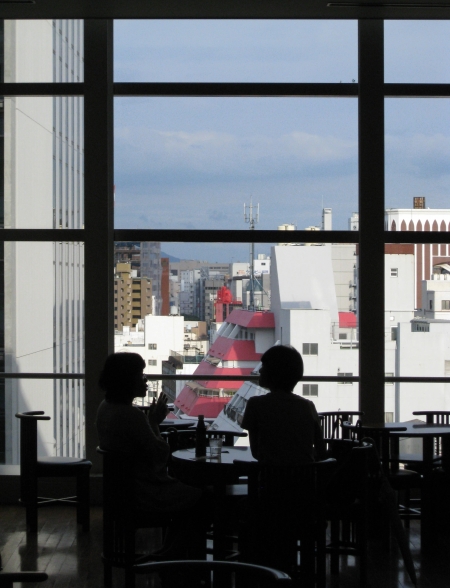on TATE or not


Of course the Fukuoka Asian Art Museum is not the Tate Modern (just already by its size), however as it is located on top of a big building it shares with the Tate Modern the property to have a coffee bar with big windows and magnificienz views.
Recently I had the problem to find an appropriate work place i.e. the math department and library are still in the entry lane of Fukuoka airport, the appartment was occupied and there is no silent cafe anywhere around here. Hence for working I decided to go to the Fukuoka Asian Art Museum – I knew that it is a rather tranquill place with this breathtaking sight on the dark Fukuoka mountains.
However last time the cafe was -due to vacation time- full with kids laughter and their whirling around, so that I actually didnt get much work done, or in other words instead of focusing on math I was rather procastinating and staring out of the windows or at what was happening around me.
Not very efficent. I know. Maybe I am a bit hypersensitive to noise and disturbances.
Other people may have other (and probably more efficent) ways to procastinate.
E.g. Scott Aaronson of the blog Shtetl-optimized had recently -as his way to procastriate- created a scatterplot, which he calls “The Pareto curve of freedom”.
The scatter plot ranks 156 of the world’s countries (those for which data was available) along two axes – one labeled with a scale for “political freedom”, as rated by Freedom House’s 2008 Freedom in the World survey and one labeled with “economic freedom”, as rated by the Heritage Foundation and Wall Street Journal’s 2008 Index of Economic Freedom.
The motivation for creating the scatter plot was to discuss the question:
Is economic freedom (again, as defined by Heritage/WSJ) the friend or enemy of political freedom?
On one side of this question, he cites Milton Friedman:
Historical evidence speaks with a single voice on the relation between political freedom and a free market. I know of no example in time or place of a society that has been marked by a large measure of political freedom that has not also used something comparable to a free market to organize the bulk of economic activity. (From Capitalism and Freedom, quoted by Wu and Davis)
and
On the other side we have anti-globalization activists like Naomi Klein (author of The Shock Doctrine), who say that “economic freedom” simply means the freedom of multinational corporations to exploit the public, and as such is incompatible with political freedom.
Among others Scott Aaronson deduces from his scatter plot that:
Political and economic freedom are correlated.
and
by and large, economic freedom helps make countries richer, and being richer helps make them more politically free. Assuming that claim is correct, score one for Milton Friedman.
Moreover he states that:
There might be a “Pareto curve of freedom”: that is, a basic tension between economic and political freedom that prevents them from being maximized simultaneously.
He (what he called himself buntly) illustrated the hypothesis of a tradeoff between economic freedom and political freedom by the following:
If poor people can vote, one of the main things they vote for is to redistribute money to themselves. There are then three possibilities:
-either redistribution takes place (and economic freedom as defined by Heritage and the Wall Street Journal goes down),
-or the poor majority is violently suppressed (and political freedom goes down),-or the government is overthrown.in a comment to himself he added:
However, since 1980 or so the Republicans have perfected a fourth approach: namely, convincing the poor to vote against their own economic interest by riling them up about unrelated issues (God, guns, & gays).
Concluding he notices in his blogpost:
Amusingly, Friedman and Klein seem to be in complete agreement on this central point: it’s just that one of them laments it while the other relishes it.
I would like to make some remarks to this analysis.
I think it may be a bit missleading if one defines “political freedom” more or less alone by the “political possibilities of action” you have (on paper), as given roughly by the Freedom In The World 2008 Checklist The key point being here: How much navigation space is there to actually perform rights (given that they are existing)?
Just to give you some examples: If a worker may drop dead because he/she has to work 12 hrs a day and more then there is no real time to make use of rights. If a company uses subtle methods (like hire and fire) in order to restrict the rights of their employees like to speak openly about certain issues or even puts them under moral pressure -then this is rather undemocratic. If a hockey-mom from mid-west of the US (you may replace hockey-mom from mit-west, also by farmer in lower bavaria or shop assistant in Osaka etc. -it is just an example and of course not all hockey moms of mid-west are uninformed etc. (also if I personally have met mostly only these scary examples)) had never the actual possibility to travel around and to learn about other cultures and political and economical approaches then it is clear that she may be very prone to be lured into whatever.
I.e. political rights are making only a real impact if there is also a culture and encouragement of free societal debate, if historical, cultural, technological, political and economical ressources are easily accessible to everybody and if everybody has appropriate free space to make use of them.
Poor people often do not have access to ressources and this in a very direct way – e.g. they just do not have time and/or they dont have the money for books, newspapers etc., but also if people have the money and time in principle -their hunger for political participation may easily be appeased with shopping, entertainment etc. – in particular if they know only this kind of culture.
This displays also that the definition of “poor” should not a priori be linked to “money”. Or in other words: i would like to call a person “poor” rather if it has no appropriate means (this certainly includes money, but it also includes access to knowledge etc. in a more general way) in order to fully participate in a democratic society.
And if you want a blunt and a bit exagerated analogy: If you have a walking disabled person then it is a bit cynical to speak about his/her freedom to run.
There was also a comment in the blogpost asking for a correlation between political freedom and economic performance (not quite the same as economic freedom) and yes I think it may be important to take also these components into account -especially with regard to the current financial crisis.
I am currently reading Joseph Stiglitz’ book “Making Globabelization Work“. If I find more time and will to procastinate I may make some comments on that.
October 24th, 2010 at 4:47 pm
Nad wrote: “..and of course not all hockey moms of mid-west are uninformed”
Really? Frankly speaking if you compare the typical mom from mid-west with a “mom” which comes for example from an educated country like – lets say from sweden – then I think the facts are clear: informed hockey moms of mid-west form a set of measure zero!
October 20th, 2011 at 10:08 pm
Scatter plots are good. I like these scatter points in queue. This Naomi Klein should make her public statements more interesting with more scatter plots!
October 26th, 2011 at 5:20 pm
Victor wrote:
I think scatter plots are not automatically making something more interesting. And sometimes they may not even be suitable, like if you have for example a novel, then for some cases it may eventually be distracting to have a scatter plot in between. On the other hand scatter plots can eventually be very interesting and helpful. Last but not least there may be different learning styles and other cognitive pecularities. Like some people don’t even like illustrations in novels. So this may be quite individual.
But if you like scatter plots of the above sort, then you may like the one in this article:
Researchers find a country’s wealth correlates with its collective knowledge